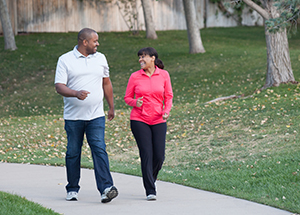Recovery from Heart Surgery: The First Few Weeks
Recovery from Heart Surgery: The First Few Weeks

Walking
Walking is one of the easiest and best ways to help yourself get better. When you walk, your legs pump blood to your heart. This improves blood flow throughout your body. Choose a safe place with a level surface. A local park or a mall are good choices. Begin by walking for 5 minutes. Walk a little longer each day.
Driving
Your reflexes will be slow for a while. Also, some of your medicines can make you drowsy. Let others drive until your surgeon says you can begin driving again. When you are in a car, wear your seat belt.
Lifting
For the first 4 weeks, don’t lift more than 10 pounds. Your healthcare provider may give you specific limits on how much you can lift.
Showering
You may feel weak the first few times you shower at home. Ask someone to stand nearby in case you need help. Avoid using very hot water. It can affect your blood flow and make you dizzy.
Working
Your healthcare provider can advise you about the best plan for returning to work. You may be able to return part-time to a desk job 1 to 2 weeks after your surgery. If you have a more active job, you may need to wait longer.
Making love
Unless your healthcare provider tells you otherwise, you can resume having sex as soon as you feel comfortable.
Your feelings
It’s common to feel a little depressed or frustrated while healing after major surgery. You might feel cheerful and energetic one day, then cranky and tired the next. You may find it hard to concentrate or to sleep. Or you may not be hungry. These things will get better soon. Don’t withdraw from your family and friends. Keep talking, listening, and supporting each other.
What to watch for
Watch for any signs of infection. These include fever, chills, or redness, drainage, or more pain at your incision site. Contact your healthcare provider if any of these occur.
Learn to take your pulse. If you develop a high and irregular heart rate, call your provider right away. If you become dizzy and you don't feel better when you sit down, you may have low blood pressure. Have someone take your blood pressure or call your provider.
Updated:
December 12, 2017
Reviewed By:
Fetterman, Anne, RN, BSN,Image reviewed by StayWell art team.,Mancini, Mary, MD